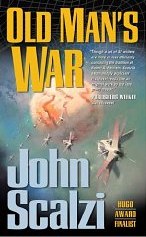Old Man's War
by John Scalzi
The novel begins with a lyrical, deeply-imagined exploration of what it means to be old. Our wife is dead, our children grown, and we are about to enlist, on our 75th birthday, in the Colonial Defense Forces. That’s the way the army works: you don’t get to enlist until you’re 75, and once you ship out, son, you can’t come home again.
There was a xenobiological plague a while back, and so earth is quarantined. Nobody on earth really knows what’s going on in the space colonies, except that the only way to go there is to join the army. If you come from a country that can’t support its population, like India and Bangladesh and Norway, you can be a colonist at any age. Otherwise, it's the army for you.
So we say goodbye to everything and board the space ship for Parts Unknown. This is done well, intelligently, with some sensitive portraits. It’s a clever conceit, a stock situation for kids but populated exclusively by old people who have already done this stuff and who can think about it. Lunchroom cliques? Been there. Opaque bureaucracy? Coming right up. They’ve read all the boarding school books, they know all the boot camp movies.
And then, suddenly, we’re thrown into combat – and into second rate Republican Party propaganda. We travel the galaxy, defending people from ruthless invaders whom we exterminate with gallantry and without remorse. We fight alongside with Good Guys (some of whom are girls). We meet Idiots, who annoy us for a while until the enemy kills them. One of the idiots is a bad parody of a Massachusetts senator who tries to make peace and is blown away; whether the intended target is John Kerry or Edward Kennedy, it's both off-target and offensive.
In another mission, our army is called in to break an oil worker’s strike. The union leaders are faceless idiots and our army, having been angered by their violent resistance, commits dozens of war crimes while breaking the strike. We report these crimes as if they were something of which we were modestly proud, and there are neither investigations nor trials in their wake. We buy off the bad taste with a perfunctory episode of battle fatigue, and then we have a rather good heroic climax.
Reading this book, I thought for a time that it was a victim of editorial inattention, that the author needed to be shown where he went off the rails. But the wrong-headed second half is so thoroughly wrong-headed that I think this vision needs correction. This Hugo winner will be remembered, but not altogether fondly, as SF's acme of Bushism.
